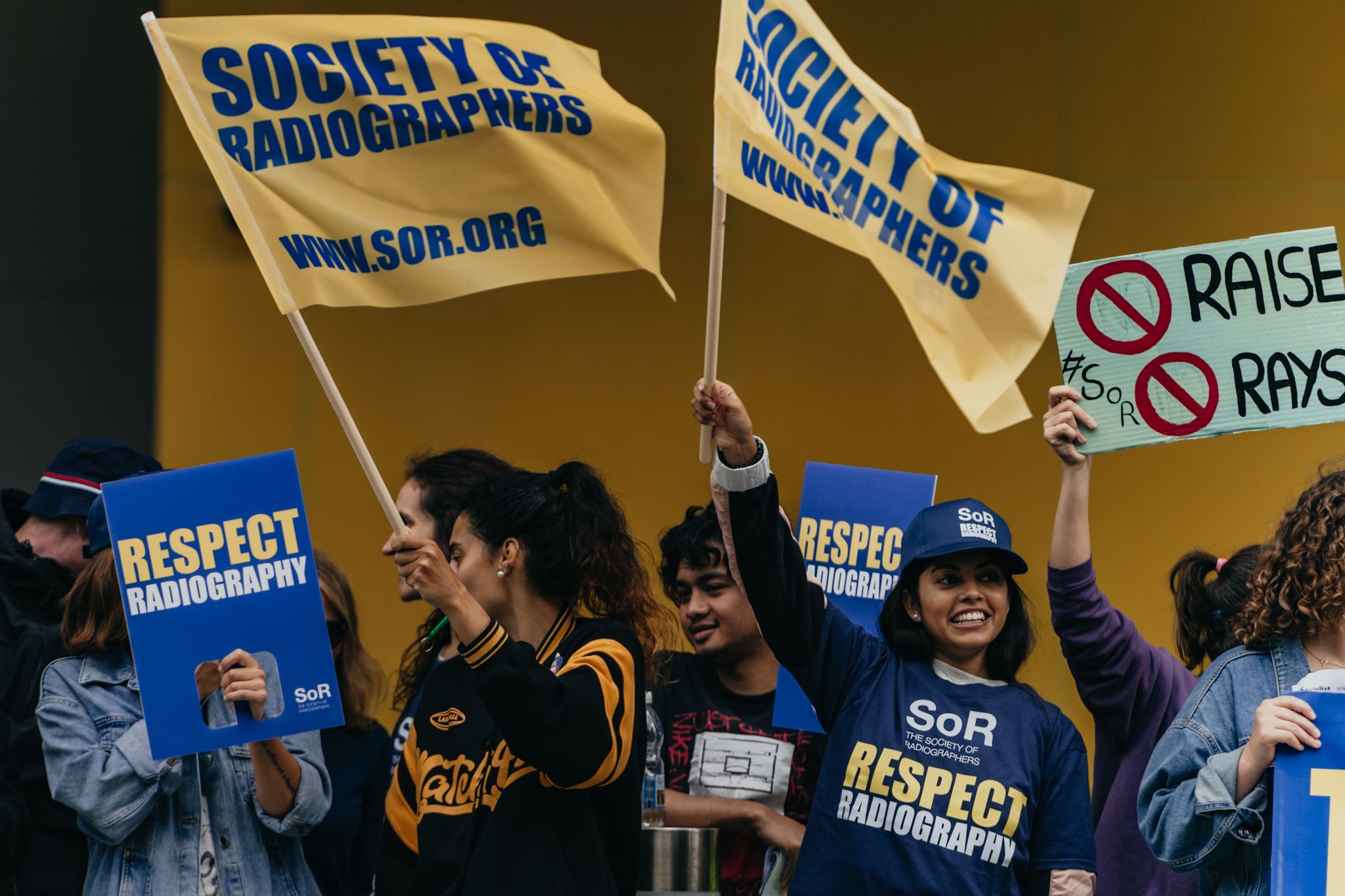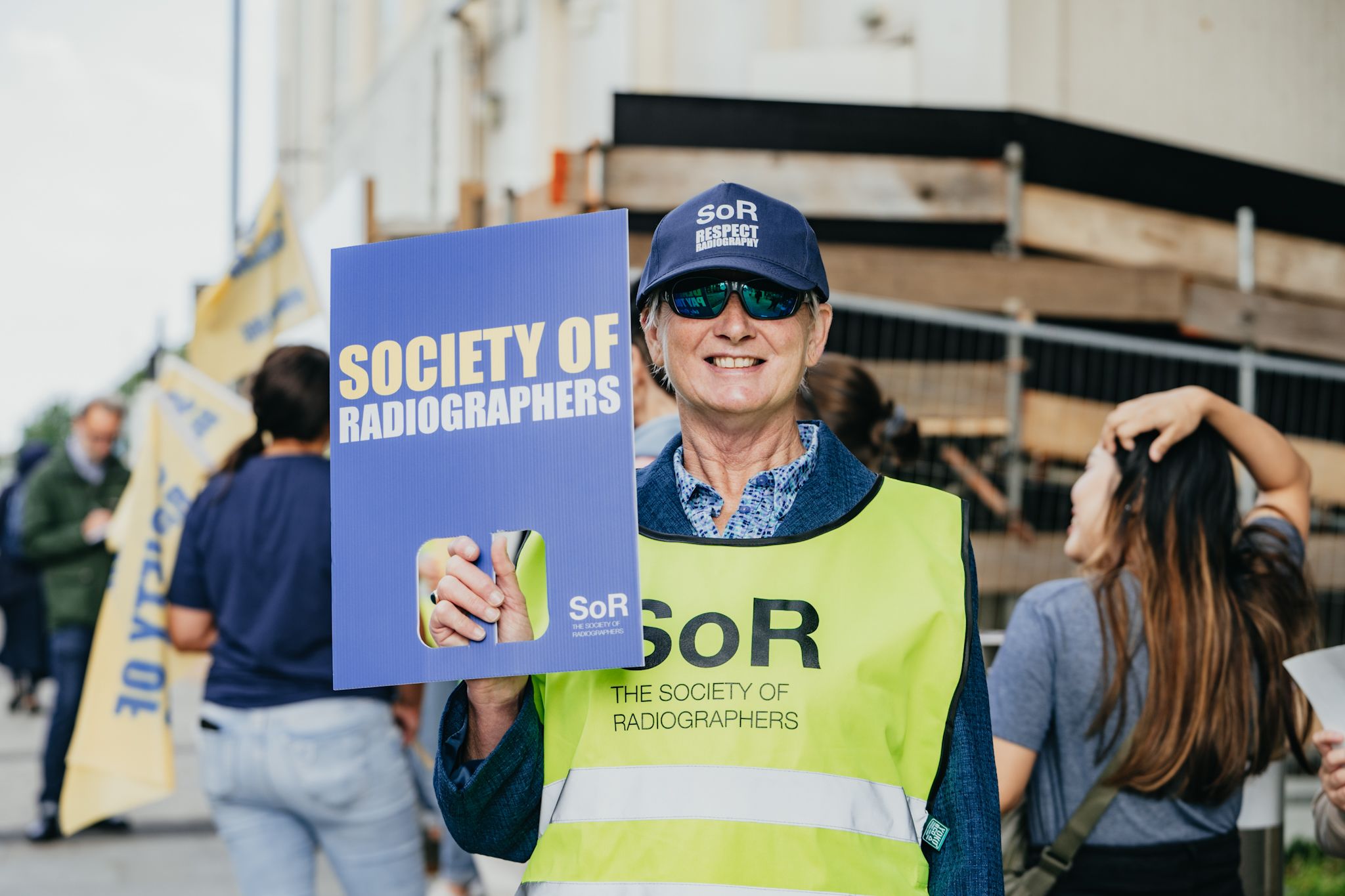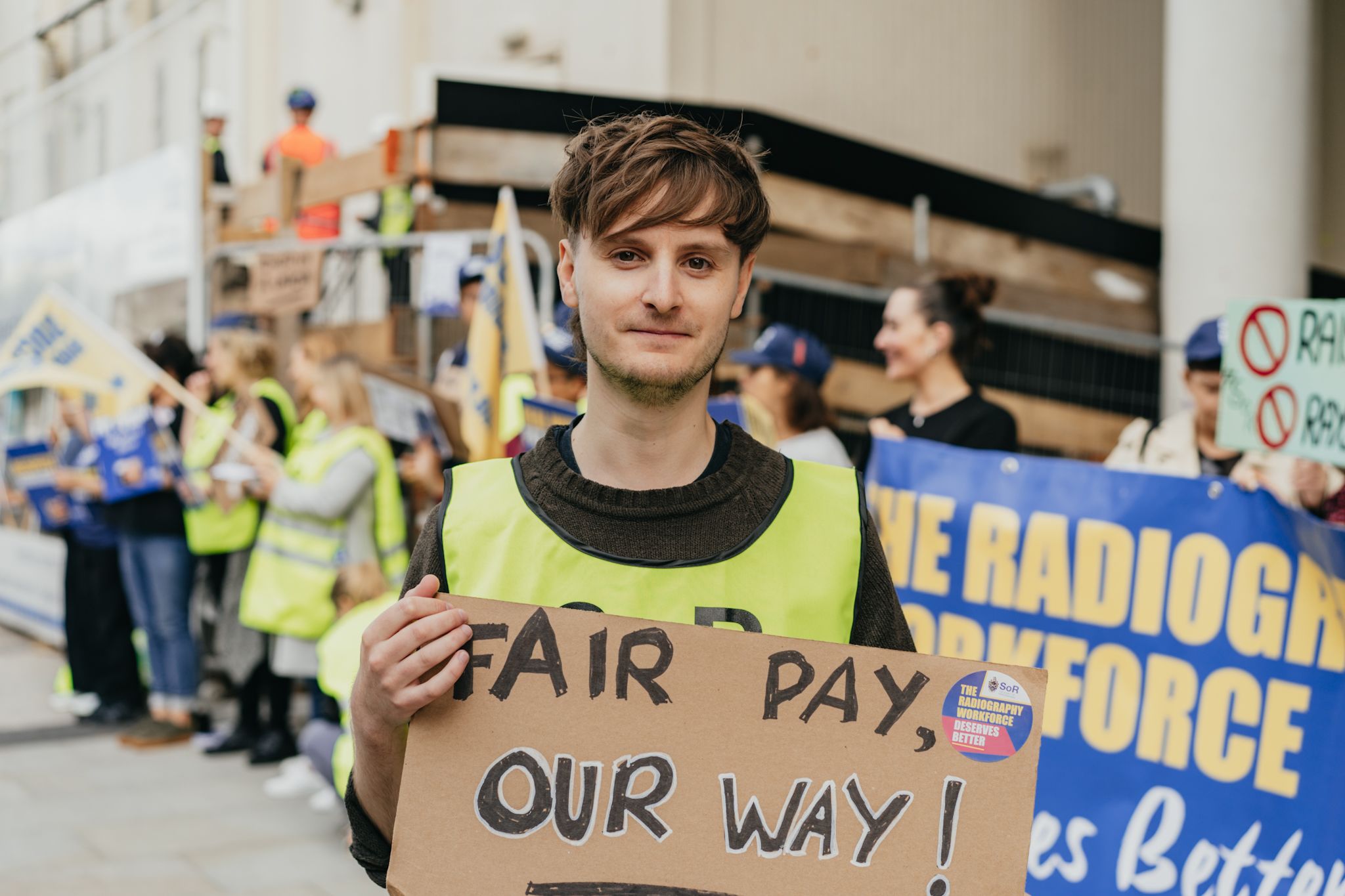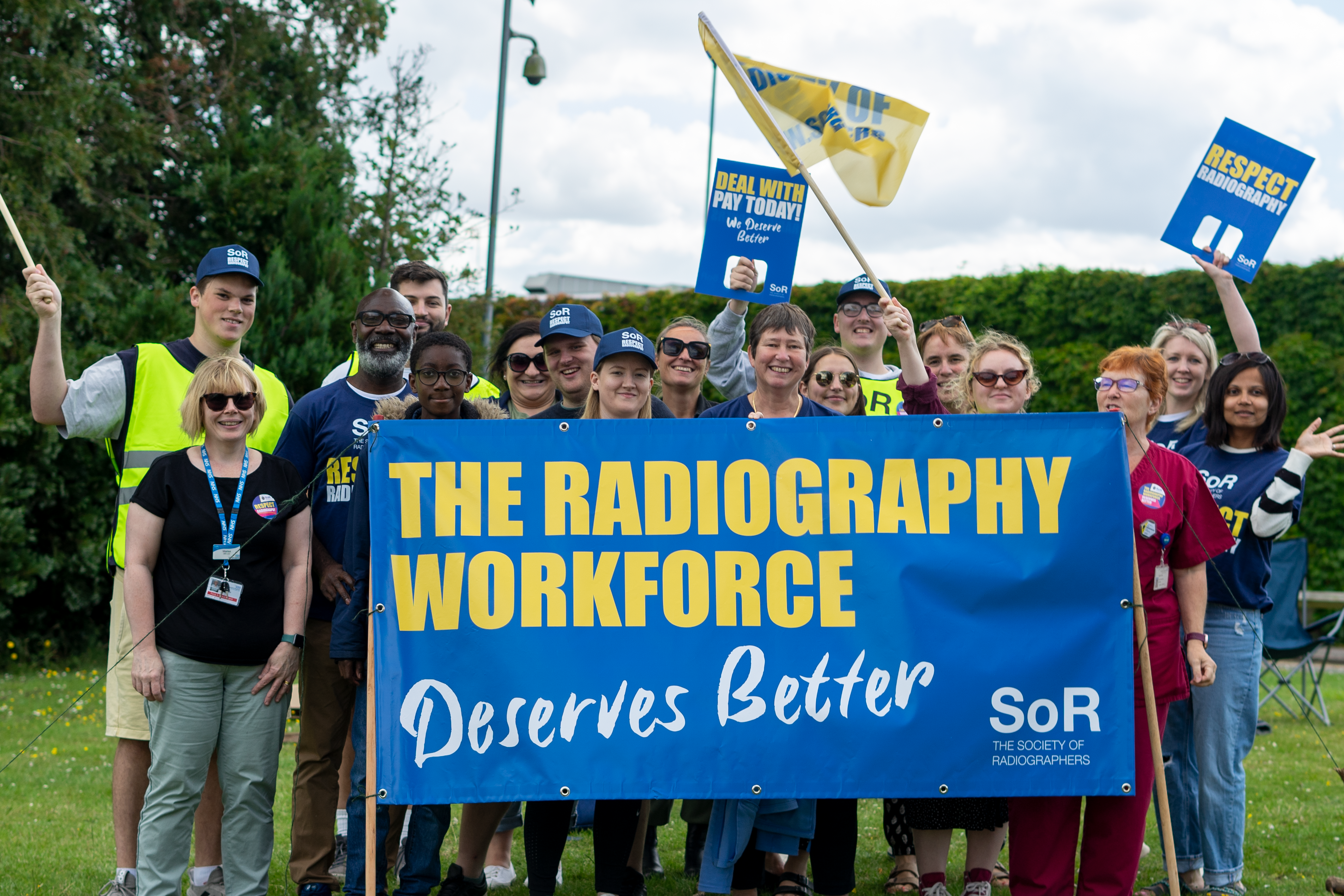News
Making our voices heard!

Despite the last-minute demand from health secretary Steve Barclay to “call off the strikes”, radiographers were determined to continue their fight for the respect of governments ministers, who had refused to talk to representatives from the Society of Radiographers.
The SoR had called on the government to re-open the NHS 2023-24 pay round after the latest rises for other public sector workers outstripped the earlier 5% awarded to radiographers in England.
A 48-hour strike went ahead as planned at 8am on 25 July and soon the whole country was talking about radiography.
“If people did not know about the radiography workforce and its central role in supporting patient pathways, many, many more will know now,” said Dean Rogers, the Society’s executive director of industrial strategy. “Awareness of the SoR’s role in being the voice of the radiography profession has never been higher – and it's as a direct result of the fantastic support and activism of members.”
SoR members took action in 37 NHS trusts across England following a ballot on industrial action, in which 70 other trusts were within 2% of meeting both the legal thresholds required to strike.
Here we share your news, views, photos and videos from the picket lines, social media and across the national and local media, highlighting the solidarity of the profession and the public's support as the campaign continues.
Taking over Twitter
Radiographers across the country posted photos and videos, winning public hearts and minds in the process
Striking by the seaside
In Brighton, more than 20 diagnostic and therapeutic radiographers joined the picket line outside the Royal Sussex County Hospital.
“Radiographers had to think long and hard about whether to take this action, because of the impact on waiting times”, said Marie Bullough, SoR regional officer for South East England. “But the feeling is very strong. Radiographers are really angry, particularly because the government has accepted higher pay review body awards for other sectors having given us 5%. Pay is the solution to all the problems, because better pay improves recruitment and retention – and more radiographers means shorter waiting lists.”
Marie Bullough: “Radiographers are really angry”
Marie Bullough: “Radiographers are really angry”
Senior CT radiographer Helen Leswell, wearing a “Respect Radiography” t-shirt, said the combination of high workload and low pay had given radiographers little choice but to strike.
“None of us wants to strike but so few of us are able to make ends meet," she said. "Brighton is as expensive as London but there is no cost-of-living allowance so we have to pick up extra shifts all the time. It’s becoming difficult to keep doing the job long term because it’s so tough mentally and physically to keep going, and we just see waiting lists and the backlog rising. We want a sustainable future."
Anthony Yip, waving a “Deal with pay today!” placard, has been a diagnostic radiographer for 10 years and has only seen pay decline for radiographers over that period. “Pay has fallen in real terms, workload has gone up and staffing levels have been reduced while services are expanding,” he said. "We are trained to a high standard but cannot provide the care we want to on a day-to-day basis.”
Anthony said the government needed to “correct the historic wrong” of successive pay cuts in real terms. “Obviously the strike action is disruptive but the public seem to be supportive and they know what we are fighting for. It’s for pay and for the whole system to be properly funded.”
Diagnostic radiographer Matt Johnson gripped a home-made placard that demanded “Fair Pay Our Way!” The radiography profession had been “brushed under the carpet” said Matt. “We have a specific role that only we can do, and we are a profession that deserves a proper pay rise like the others.”
Matt Johnson: “We deserve a proper pay rise”
Matt Johnson: “We deserve a proper pay rise”
Local news hits home
As news of the radiography strike swept through national media channels, local media coverage proved effective in bringing the public hard-hitting stories from closer to home.
The Colchester Gazette reported from the picket line at Colchester Hospital, Essex, quoting a radiographer who said she had no option but to strike: "I’m really passionate about and love this profession but it’s a profession that is really struggling, and staff are leaving the NHS in droves because they’re being paid better elsewhere.”
ITVX in the Midlands was broadcasting live from the picket line at Nottingham's City Hospital as SoR members waved placards in the background. Watch the video here.
London News Online ran the headline “I’m doing 50-hour weeks to make ends meet” and quoted a radiographer at King’s College Hospital saying: “I’m senior staff and I have to work extra shifts at the weekend to survive.”
Bristol’s B24/7 carried photography of picketing radiographers at Bristol Royal Infirmary and reported a therapeutic radiographer saying: “We are really struggling to fill our roles, which is mirrored across the whole country. It’s especially bad in Bristol because it’s such an expensive city to live in.”
The Doncaster Free Press heard from a Yorkshire radiographer how difficult it was to pay her bills: “I work 22.5 hours basic. But I probably do at least 40 hours a week. Some weeks I’ve gone up to 55 hours in one week. We’re doing well in excess of double hours sometimes. And that’s as a part-timer.”
The Liverpool Echo spoke to a 30-year-old city radiographer, who was still living with his parents: “That’s just the reality of where we are. Even as a senior radiographer, I would find it very difficult to purchase my own home.”
In Suffolk, the Ipswich Star carried photographs of the SoR picket line at Ipswich Hospital and quoted a diagnostic radiographer who spoke on the problems of recruitment and retention: “We're seeing our colleagues crying on a regular basis and lots of people are leaving the profession.”
In Devon, the Plymouth Herald interviewed a mammographer, who said: “We’re all working for what feels like pennies. Breast services have the funding but other services don’t have the funding to make things better, and the conditions are really, really bad.”
Animal magic
Morale was high on the picket lines and, despite the serious message, the mood was upbeat, bolstered by the presence of some supportive family pets…
Unprecedented impact
“Your enthusiasm on the picket lines and social media has been both humbling and uplifting,” said Dean Rogers. “I don’t think any of us at the SoR have ever been prouder to support the profession. We are especially grateful to all the members who stepped up to tell their stories and humanise our arguments across the media, as well as all those who took part in the action and those who provided the emergency skeleton services that helped us win the public battle for hearts and minds. We’d also like to thank those in the trusts that were unable to take part, who encouraged and supported their colleagues.
“The impact in raising the profile of radiography and awareness of the workforce challenges is unprecedented. We now carry this momentum forward and hope the government will listen, engage and make the need for further action unnecessary.”
Radiographers show their solidarity at Basingstoke and North Hampshire NHS Trust
Radiographers show their solidarity at Basingstoke and North Hampshire NHS Trust
Find out more...
For everything you need to know about industrial action, visit the SoR’s Industrial Action Toolkit for all members. This is a generic resource to cover all industrial action, whether in the NHS or in the private sector.
Image credits: Eva Slusarek (Brighton), Kenneth Christian Agustin (Basingstoke and North Hampshire).




